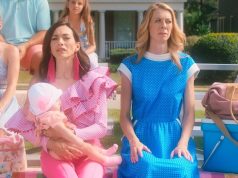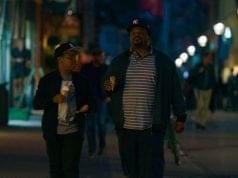Poor Gracie Bowen. All the 15-year-old wants to do is play soccer. But the boys and men in her town all say a soccer field is no place for a girl! Those meanies!
This is New Jersey, 1978, where the actress Elisabeth Shue grew up. Her brother Andrew helped conceive this story, basing it on their experiences as children; both Andrew and Elisabeth play supporting roles; and her husband, Davis Guggenheim, has directed it — directed it like the drippy, faux-inspirational sports drama it is.
Soccer is all the Bowen family cares about. When Dad (Dermot Mulroney) and the boys babble on and on about it at the dinner table, Mom (Elisabeth Shue) says, “Can’t we talk about something else?,” and Dad replies, “There is nothing else.” SO SHUT IT, MOM!
Even Gracie, the one Bowen daughter among three sons, is smitten with soccer fever. She practices frequently with older brother Johnny (Jesse Lee Soffer), the high school’s golden boy, and sometimes they use her skills to hustle neighborhood kids who don’t believe a girl could be any good at soccer.
But then there is tragedy, leading Gracie to declare that she will join the varsity soccer team next year and honor the memory of the person killed in the aforementioned tragedy! Whoever that might be. (No spoilers here!) Her parents think this is ludicrous, and for some reason when her dad makes her run drills in the backyard, she is suddenly horrible at it, thus sort of proving him right. She’s told to forget her stupid dream of playing soccer and get back to her normal life. (Did they not know that she used to play with Johnny all the time? Is her fondness for soccer a complete secret?) This leads to months and months of Gracie turning sullen and rebellious … or the family-friendly PG-13 version of rebellious, anyway; she smokes cigarettes, spray-paints walls, and very nearly goes to second base with a boy.
It is obvious to even the retardedest of observers that Gracie is acting out in this manner because she’s being denied the one thing she wants. Eventually her father realizes this, does a 180, and starts training her intensively so she can try out for the team — if the school board even lets her.
About one-half of all the lines of dialogue in the film mention the fact that Gracie is a girl. It is seemingly the only thing the movie is about. Yes, it’s her gender that’s creating such opposition to her soccer ambitions, but does it need to be stated every 10 seconds? The constant repetition can make a movie get old real fast.
The performances are all decent enough (especially Carly Schroeder’s sparky, Norwegian-looking Gracie), but the film gives them little to work with. Minds change instantly and without warning. Gracie’s mother’s purpose seems to be to second-guess and disparage everything that everyone does, her reasons never quite clear. In one scene Gracie and her best friend have a fight; in the next scene, they are pals again.
I should also mention the laughably obvious symbolism in the form of a bird Gracie keeps as a pet. “That bird will never fly!” her friend tells her dismissively early in the film. But you know what? Someday that bird WILL fly! And so will Gracie! Because the bird is a metaphor for Gracie! And at the end of the movie, they both fly, one literally and one metaphorically! It’s deep!
(It’s not explained why the bird’s flying abilities are in question. I mean, it’s not like she’s got a chicken in a cage. It’s a regular bird, the kind that flies. Why wouldn’t it fly? Was it injured? If it was, that would be a good thing to tell us. Otherwise, your ham-fisted attempt at depth is not only transparent, but illogical. I’m just sayin’.)
Mocking a movie as earnest as “Gracie” is probably bad form. It was obviously a labor of love for the Shue family, and more power to ’em. As labors of love go, this one is harmless enough. It’s just not particularly elegant or well-crafted, or even inspiring, to be worth seeking out. Unless you happen to be a Shue, too.
C (1 hr., 35 min.; )





